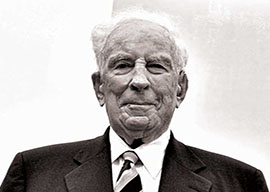
January 04, 2011

Yet he was there in the thick of the battle against NAFTA, GATT and the new World Trade Organization. He opposed MFN and PNTR for China. He broke with the party he helped to build to back candidates who would stand with him, as he watched the U.S. trade deficit rise and rise, tens of thousands of industrial plants close and millions of manufacturing jobs leave for Asia. It came close, I believe, to breaking his heart, for he so loved his company and his country.
Intellectuals deride “paternalistic capitalism,” the idea that men who begin and build companies know better than investors, unions and markets what is best for them and their workers.
Roger Milliken exemplified the best of that dying breed.
When his carpet plant in La Grange, Ga., burned down on Jan. 31, 1995, Roger could have collected the insurance money, taken advantage of NAFTA, built a new plant in Mexico, employing the same low-wage labor some of his rivals were using, and pocketed the difference as profits for his company.
Instead, he arrived in La Grange the morning after the fire, gathered the stunned workers, told them he would find temporary jobs for them, then pledged to have the most modern carpet factory in the world built on that same site in six months.
He moved his La Grange workers to plants across the South, even to England, and called friendly rivals to ask them to hire his people. He moved to La Grange, oversaw the design of the new plant, brought in 3,000 construction workers and craftsmen, and directed the round-the-clock triple shifts to rebuild his burned-out factory.
A reporter called it with amazement “a company taking care of its company town.” As promised, on Aug. 1, 1995, the new plant opened.
Roger Milliken belonged to a rare species of men who used to be more common here in America than anywhere in the world. With his liberal arts degree from Yale, he was a man of ideas and a man of action. He had the ability to enlist creative genius, managerial talent and loyal workers to build an empire of production that was the best in the world. He wished to be remembered with a single word: builder.
That he was, and if America is in a time of decline, it is because we no longer produce many men like Roger Milliken.